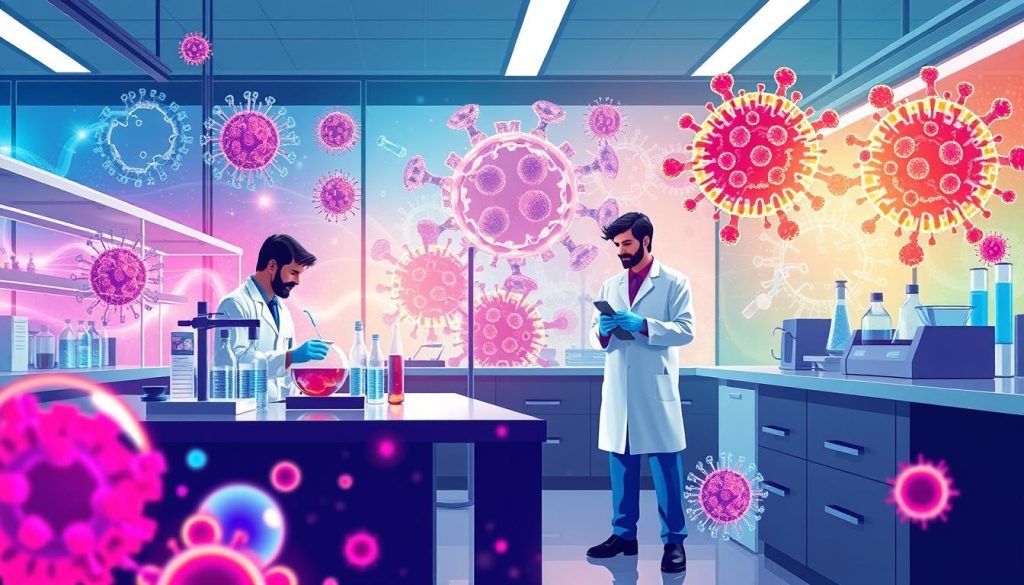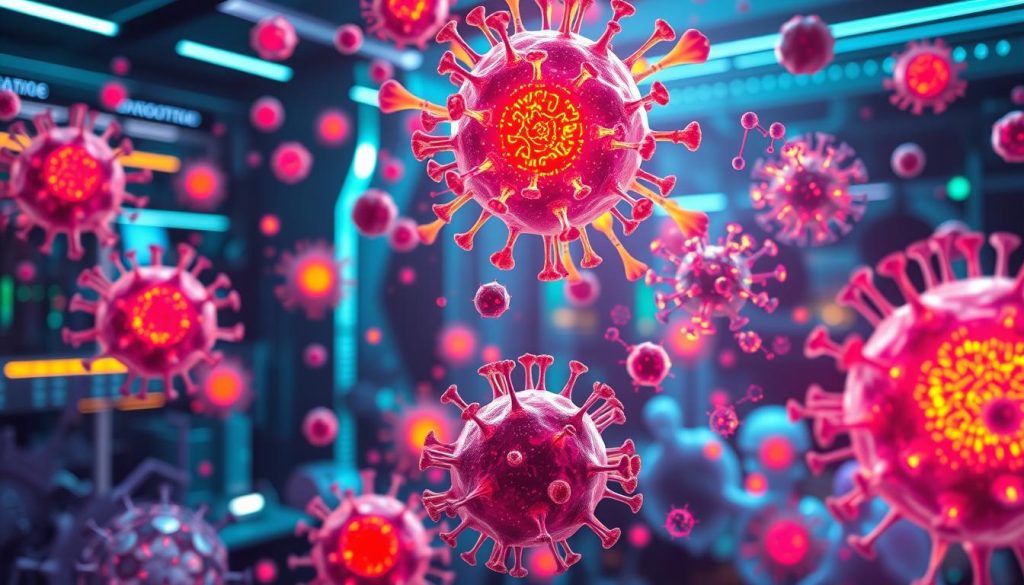Medical science is moving fast, changing how we treat cancer treatments. CAR T cell therapy is a big step forward. People often wonder if it’s like chemotherapy or something new. This guide aims to explain CAR T cell therapy and how it’s different from traditional treatments.
It’s all about understanding the latest in cancer care. This will help those fighting cancer and their loved ones.
Key Takeaways
- Define CAR T cell therapy as a cornerstone in the evolution of cancer care.
- Clarify the differences between CAR T cell therapy and traditional chemotherapy.
- Shed light on CAR T cell therapy as an emerging leader among advanced cancer therapies.
- Inform patients about the therapeutic options and respond to the common question: Is car t cell therapy chemotherapy?
- Offer insight into the personalized approach in treating various forms of cancer through CAR T cell therapy.
Understanding Car T Cell Therapy
Car T cell therapy is a new way to fight cancer. It’s different from old treatments because it’s made just for you. Let’s look at what makes this treatment special.
Definition of Car T Cell Therapy
Car T cell therapy changes your T cells to fight cancer. These T cells can find and kill cancer cells. It uses your body’s own defense to target cancer.
Differences Between Traditional Chemotherapy & Car T Cell Therapy
Chemotherapy hurts healthy cells too. But CAR T cell therapy only goes after cancer cells. This means fewer side effects, like hair loss and nausea.
Overview of Chimeric Antigen Receptor T Cells
Chimeric antigen receptor T cells are key to CAR T cell therapy. They’re made to find and kill cancer cells. This is a big step forward in fighting cancer.
The success of CAR T cell therapy depends on how well T cells are made. The genetic changes help them find and destroy cancer cells. This shows how powerful this treatment is for cancer care.
| Feature | Chemotherapy | CAR T Cell Treatment |
|---|---|---|
| Approach | Non-specific, attacks rapidly dividing cells | Targeted, attacks only cancer cells |
| Side Effects | High (e.g., hair loss, nausea) | Reduced and more specific (e.g., cytokine release syndrome) |
| Outcome | Varied, often temporary remission | Potentially long-lasting remission |
| Usage | Broad application for many cancers | Specifically indicated for certain blood cancers |
CAR T cell therapy is more than just a new treatment. It’s a big step towards better cancer care. It aims to be more effective and safer, changing the fight against cancer.
Is Car T Cell Therapy Chemotherapy?
The world of cancer treatment is changing fast. CAR T cell therapy is a big step forward, different from old-school chemotherapy. It uses your own immune cells to find and kill cancer, making it a precise and personal treatment.
This new method changes T cells to fight cancer. It’s not like traditional chemotherapy, which uses chemicals. Instead, it uses your body’s own cells to fight cancer. This makes it a key part of cellular immunotherapy and personalized cancer treatment.
- Personalized Approach: Tailors therapy specific to the individual’s cellular profile, emphasizing the cornerstone of personalized cancer treatment.
- Targeted Action: Directly engages cancer cells using engineered T-cells, reflecting the idiosyncratic model of targeted cancer therapy.
So, CAR T cell therapy is seen as a new way to fight cancer, not just another chemotherapy. It offers hope with its powerful, custom-made, and accurate treatments. It shows how cancer care is moving towards more gentle and tailored options.
The Science Behind Car T Cell Treatment
The field of immunotherapy cancer treatments has seen a big leap with CAR T cell therapy. This is a key part of personalized cancer treatment. It makes the patient’s immune cells better at fighting cancer. First, T cells are taken from the blood. Then, they are changed in a lab to fight cancer better.
After being made to fight cancer, these T cells are grown a lot. They are then put back into the patient. This method is very precise, targeting cancer cells but not harming healthy ones. It shows how personalized cancer treatment works.
| Feature | Traditional Therapy | CAR T Cell Therapy |
|---|---|---|
| Targeting Mechanism | Non-specific, affects all rapidly dividing cells | Highly specific to cancer cells |
| Impact on Healthy Cells | High collateral damage | Minimal impact on healthy cells |
| Personalization Level | Generic | Customized to individual’s cancer profile |
| Adaptive Immunity | None | Long-term immunity potential against cancer |
The table shows why CAR T cell therapy is better for immunotherapy cancer treatment. It’s more targeted and effective than old treatments. It also makes treatments safer for patients.
Fundamentals of Immunotherapy Cancer Treatment
Immunotherapy is a new way to fight cancer. It uses the body’s immune system to attack cancer cells. This method is different from traditional treatments like chemotherapy.
Principles of Immunotherapy
Immunotherapy boosts the body’s immune system to fight cancer. It changes immune cells to better find and kill cancer. This method is based on understanding how cells and molecules work.
How Immunotherapy Differs from Chemotherapy
Immunotherapy is more precise than chemotherapy. It aims to strengthen the immune system, not harm healthy cells. This makes it more effective and reduces side effects.

Immunotherapy is changing how we treat cancer. It focuses on precision and personalized care. As research grows, immunotherapy offers new hope for fighting cancer.
Development of Targeted Cancer Therapies
Cancer treatment has changed a lot, moving from broad treatments to more specific ones. This change comes from precision medicine, which treats cancer in a way that fits each patient. This new approach is changing how we fight cancer, thanks to targeted cancer therapy and personalized cancer treatment.
The Evolution from Chemotherapy to Precision Medicine
Old chemotherapy hurt both cancer cells and healthy ones. Now, we focus more on the patient’s genes and cancer type. Precision medicine aims to reduce harm and increase success, hitting cancer cells hard but sparing healthy ones.
Targeted Treatments for Specific Cancer Types
Targeted treatments are made for certain cancers. They attack specific markers in cancer cells, not healthy ones. This makes treatment better and safer for patients.
| Aspect | Traditional Chemotherapy | Targeted Cancer Therapy |
|---|---|---|
| Cell Specificity | Non-specific, affects all rapidly dividing cells | Highly specific to cancer cells |
| Side Effects | High (e.g., hair loss, nausea) | Reduced and more manageable |
| Outcome | Generalized treatment with varying results | Improved efficacy with precise targeting |
| Personalization | One-size-fits-all approach | Tailored to individual genetic profiles |
The progress in personalized cancer treatment is huge. It’s not just science; it’s a big step towards better, more caring care. It’s a new chapter in fighting cancer, using targeted cancer therapy and precision medicine.
The Process of Car T Cell Therapy
This section dives into the latest in car t cell treatment. It explains how chimeric antigen receptor t cells are reprogrammed. This marks a big step forward in cancer cell therapy. We’ll look at each key step from start to finish.
Engineering T Cells to Fight Cancer
To start CAR T cell therapy, T cells are taken from the patient’s blood. These cells are then changed in a lab. They are made to have special receptors called CARs on their surface.
These CARs help the T cells find and attack cancer cells better. This shows a big step towards medicine made just for you.
Steps Involved in Car T Cell Therapy
The car t cell treatment process is detailed and has several stages:
- T Cell Collection: Blood is taken from the patient, and T cells are pulled out using leukapheresis.
- Genetic Modification: The T cells are then changed in a lab to make CARs that target cancer cells.
- Expansion: These modified cells grow in the lab until they become millions strong, ready to fight cancer.
- Reinfusion: The T cells are put back into the patient’s blood. They then go after and kill cancer cells.
This technology is precise. It targets cancer cells well but also protects normal cells. This reduces harm to the body.

| Phase | Process | Description |
|---|---|---|
| 1 | Cell Collection | T cells extracted via leukapheresis |
| 2 | Genetic Engineering | Introduction of chimeric antigen receptor into T cells |
| 3 | Cell Expansion | Cells are multiplied to sufficient numbers |
| 4 | Reinfusion | Engineered T cells are reintroduced into patient’s body |
This detailed approach shows the clinical precision of car t cell treatment. It highlights the potential of chimeric antigen receptor t cells to change cancer cell therapy forever.
Personalizing Cancer Treatment with Car T Cell Therapy
The arrival of CAR T cell treatment marks a big change in fighting cancer. It’s part of precision medicine, using a patient’s immune system to target cancer. This method is made just for each person, based on their genes.
Personalized cancer treatment is all about matching treatments to each patient’s cancer. CAR T cell treatment does this by changing the patient’s T cells to find and kill cancer cells. First, T cells are taken from the patient. Then, they’re changed to have special receptors called CARs.
When these CAR T cells go back into the body, they can find and destroy cancer cells. This precision medicine approach is more focused on cancer cells. It might also mean fewer side effects than traditional treatments like chemotherapy.
- Enhanced specificity in targeting cancer cells
- Potentially fewer side effects
- Improved chances of remission in acute and chronic cases
As precision medicine grows, CAR T cell treatment plays a key role. It offers hope to those who haven’t seen results from usual treatments. It’s leading to more personalized and effective ways to fight cancer.
Eligibility Criteria for Car T Cell Therapy
Looking into eligibility for CAR T cell therapy and the cancer cell therapy types it treats is key. This part explains who might get this new treatment.
What Makes a Good Candidate for Car T Cell Therapy?
Being a good candidate for CAR T cell therapy depends on your cancer type and stage. Those who haven’t gotten better with usual treatments like chemo might try this. Also, you need to be healthy enough to handle the treatment’s challenges.
Types of Cancer Treated with Car T Cell Therapy
Cancer cell therapy types include lymphomas and leukemias that CAR T cell therapy helps. These treatments are made to fit each patient’s needs, aiming for better results.
| Cancer Type | Response Rate to CAR T Cell Therapy | Treatment Availability |
|---|---|---|
| Acute Lymphoblastic Leukemia (ALL) | Approx. 70-90% | Widely Available |
| Diffuse Large B-Cell Lymphoma (DLBCL) | Approx. 50-70% | Widely Available |
| Follicular Lymphoma | Approx. 80% | Selective Availability |
| Mantle Cell Lymphoma | Approx. 60-75% | Emerging Treatments |
The Benefits of Car T Cell Treatment
Exploring the transformative impact of CAR T cell therapy in oncology, this section delves into its significant contributions to treating relapse cancer and fostering possibilities for long-term remission.
Effectiveness in Treating Relapse or Refractory Cancer
With the remarkable advancements in medical technology, CAR T cell therapy has emerged as a groundbreaking approach in treating relapse or refractory cancer. This therapy is particularly beneficial for patients whose cancers have proven resistant to conventional treatments. By harnessing the body’s own immune cells and reengineering them to fight cancer more effectively, CAR T cell therapy targets cancer cells with precision, reducing the risk of damaging healthy tissues.
Potential for Long-Term Remission
One of the most promising benefits of CAR T cell therapy is its potential to achieve long-term remission in patients. Studies show that this treatment can lead to sustained remission, turning a once-relentless malignancy into a manageable chronic condition. This potential not only offers hope to millions suffering from hard-to-treat cancers but also underscores the power of personalized medicine in oncology.
- Durable remission rates
- Decreased relapse incidences
- Improved quality of life for patients
As we continue to witness significant successes in treating relapse cancer and achieving long-term remission, the potential for CAR T cell therapy to alter the landscape of cancer treatment is immense. Each advancement brings new hope to those battling this disease, highlighting the vital role of innovative therapies in the journey toward cancer eradication.
Potential Side Effects and Risks of Car T Cell Therapy
CAR T cell therapy is a big step forward in cancer treatment. But, it also has its own set of side effects and risks. It’s important for patients and caregivers to know about these before deciding on this treatment.
Common CAR T Cell Therapy Side Effects
- Fever and chills
- Fatigue
- Headache
- Difficulty breathing
- Fast or irregular heartbeats
Severe Treatment Risks
- Cytokine Release Syndrome (CRS): A rapid release of cytokines into the blood from immune cells affected by the therapy.
- Neurological Toxicities: Can include confusion, seizures, or loss of balance.
- Immune Cell Depletion: Long-term depletion of certain immune cells, leading to increased risk of infections.
- Anaphylaxis: A severe allergic reaction that can be life-threatening.
- Tumor Lysis Syndrome: Rapid destruction of tumor cells, which can lead to kidney failure and other issues.
To deal with these CAR T cell therapy side effects and treatment risks, a closely watched clinical setting is key. There must be quick action for severe side effects and ongoing care after treatment. Places that give CAR T cell therapy have plans to handle these risks well.
“Our deepest commitment in offering CAR T cell therapy is not only in its ability to treat cancer but also in making its administration as safe as possible for each patient.”
The path with CAR T cell therapy is hopeful but careful. As studies go on, doctors keep working to make these treatments better. They aim for the best results with fewer side effects.
Comparing the Costs: Car T Cell Therapy vs. Chemotherapy
It’s important for patients and their families to understand the costs of Car T cell therapy and chemotherapy. This section will look at the cost of CAR T cell therapy, insurance coverage for CAR T, and financial assistance options. We’ll compare these with the costs of traditional chemotherapy treatments.
Insurance Coverage and Financial Assistance
For cancer patients, knowing about financial support is the first step towards recovery. Insurance coverage for CAR T cell therapy has improved as it’s recognized for treating some cancers. Most health insurance providers now consider CAR T cell therapy on a case-by-case basis.
- Insurance Plans: Many health insurance policies now see CAR T cell therapies as necessary for certain conditions, leading to better coverage.
- Financial Assistance Programs: Foundations and grants offer financial aid to help with the high costs of CAR T cell therapy.
Long-Term Value of Cellular Immunotherapy
Although CAR T cell therapy costs more upfront than chemotherapy, its long-term benefits are unmatched. It offers a chance for long-term remission, which can lead to lower overall costs over time. This makes it a worthwhile investment in a patient’s health.
The table below compares the initial costs of CAR T cell therapy and chemotherapy. It also shows the differences in insurance coverage and financial aid:
| Treatment Type | Estimated Initial Cost | Insurance Coverage | Availability of Financial Aid |
|---|---|---|---|
| CAR T Cell Therapy | $375,000 – $475,000 | Case-by-case basis | High |
| Chemotherapy | $30,000 – $100,000 | Widely covered | Moderate |
Recent Advancements in Car T Cell Therapy
The world of cancer treatment has seen big changes thanks to advancements in CAR T cell therapy. This breakthrough is making treatments more precise and effective. It’s also helping to treat more types of cancer than before.

Medical research and clinical trials have led to better CAR T cell therapies. The treatment protocols have improved a lot. Now, these therapies offer personalized treatments that work better and have fewer side effects.
Improvements in Treatment Protocols and Technology
New technologies have made CAR T cell therapy more effective. Engineers have added new parts to these cells to help them grow and last longer after treatment. These changes are key, as they let doctors treat more types of cancer, not just blood cancers.
Expansion of Treatable Cancers with Car T Cell Therapy
Car T cell therapy is now being tested on different cancers. This is a big step forward, as it used to only treat a few types of cancer. Now, doctors are trying it on solid tumors like breast and pancreatic cancers, showing great promise.
The power of modern medicine is clear in advancements in CAR T cell therapy. As research keeps going, we might see these therapies used to fight even more cancers. This gives hope to patients all over the world.
Patient Stories: Success with Car T Cell Therapy
Cancer patients who got Car T cell therapy have amazing stories. These stories show how this treatment can change lives. They give hope and inspiration to others fighting cancer.
From Diagnosis to Remission: Personal Experiences
Every patient’s story starts with a scary diagnosis. But Car T cell therapy brings hope for beating cancer. These stories talk about when other treatments failed, but Car T cell therapy saved the day.
Patients share their journey to remission. It’s filled with challenges and victories. Their stories inspire others to keep fighting.
How Car T Cell Therapy Changed Lives
Car T cell therapy does more than just cure cancer. It gives patients a second chance at life. People talk about being able to do everyday things again and feeling better overall.
The emotional relief of getting closer to remission is huge. It’s a big part of their recovery and happiness.
Success stories with Car T cell therapy show its power. They help others understand its potential. These stories are key in guiding those searching for a cure in their fight against cancer.
Discussing Car T Cell Therapy with Your Oncologist
Talking to your oncologist about CAR T cell therapy is key. It’s important to understand this advanced treatment well. This way, you can know what to expect from it.
Questions to Ask About Immunotherapy Options
- What are the expected benefits of CAR T cell therapy for my specific type of cancer?
- How does my current health condition affect my suitability for this therapy?
- Can you provide details on the success rates and potential risks associated with CAR T cell therapy?
- Are there other immunotherapy options available that might be suitable for me?
- What should I anticipate during the treatment process?
Preparing for Treatment: A Patient’s Checklist
- Ensure all preliminary tests and evaluations are completed.
- Discuss with family or caregivers about the support needed during treatment.
- Arrange for transportation and accommodation if treatment is far from home.
- Prepare your body and mind through recommended pre-treatment guidelines.
- Stay informed about every step of the treatment preparation to reduce anxiety and enhance readiness.
Being prepared and informed can make a big difference. It can help you get the most out of CAR T cell therapy.
Conclusion
We’ve explored the details and breakthroughs of car t cell treatment. It’s changing how we fight cancer. This new therapy is different from old treatments because it targets cancer cells with great accuracy. It uses the body’s immune system to fight cancer.
The story of car T cell treatment is filled with hope and success stories. It shows a bright future for cancer treatment. This treatment is giving cancer patients and their families new hope.
Car T cell therapy is a big step forward. It offers a chance for remission when other treatments fail. It shows how human creativity can fight against deadly diseases.
But, there are still challenges ahead. We need to deal with side effects, make it more accessible, and make it cheaper. Yet, the progress we’ve seen is promising.
We’re excited about the future of cancer treatment. We’re committed to helping and supporting those affected by cancer. The story of car T cell treatment is about human progress in the fight against cancer.
FAQ
Q: What exactly is CAR T cell therapy?
A: CAR T cell therapy is a way to fight cancer. It uses your T cells, which are part of your immune system. These T cells are changed to find and kill cancer cells. It’s a treatment that’s made just for you.
Q: Is CAR T cell therapy considered chemotherapy?
A: No, it’s not. Chemotherapy uses chemicals to kill cancer cells but can harm healthy cells too. CAR T cell therapy targets cancer cells more precisely without harming healthy cells as much.
Q: How does CAR T cell treatment differ from traditional chemotherapy?
A: CAR T cell treatment uses your immune system to fight cancer. Traditional chemotherapy uses chemicals to kill cancer cells but can harm healthy cells too. CAR T cell therapy is more targeted and has fewer side effects.
Q: What are the steps involved in CAR T cell therapy?
A: First, your T cells are collected. Then, they are changed in a lab to find cancer cells. Next, they are multiplied and put back into your body to fight cancer.
Q: Who is eligible for CAR T cell therapy?
A: It depends on your cancer type, stage, and how it has responded to other treatments. It’s mainly for patients with certain types of lymphomas and leukemias that haven’t responded well to other treatments.
Q: What benefits does CAR T cell therapy offer?
A: It can be very helpful for patients with hard-to-treat cancers. It’s a personalized treatment that can lead to long-term remission and sometimes cure the cancer.
Q: What are the potential side effects and risks of CAR T cell therapy?
A: Side effects can range from mild to severe. They include cytokine release syndrome, neurologic toxicities, and B cell aplasia. Doctors closely watch for and manage these side effects.
Q: How does insurance cover CAR T cell therapy, and is financial assistance available?
A: Insurance coverage varies. Many plans now cover it. There are also programs to help with the costs of treatment.
Q: What recent advancements have been made in CAR T cell therapy?
A: New CAR T cells are safer and work better. They’re being used for more cancers. The process of making them is also getting better, making it more accessible.
Q: How has CAR T cell therapy transformed patient lives?
A: Many patients have seen long-term remission. Their stories show the hope and potential of CAR T cell therapy in treating cancer.
Q: What should I discuss with my oncologist regarding CAR T cell therapy?
A: Talk about if you’re a good candidate, what to expect, risks and benefits, costs, and insurance. Also, ask about other treatment options.


















